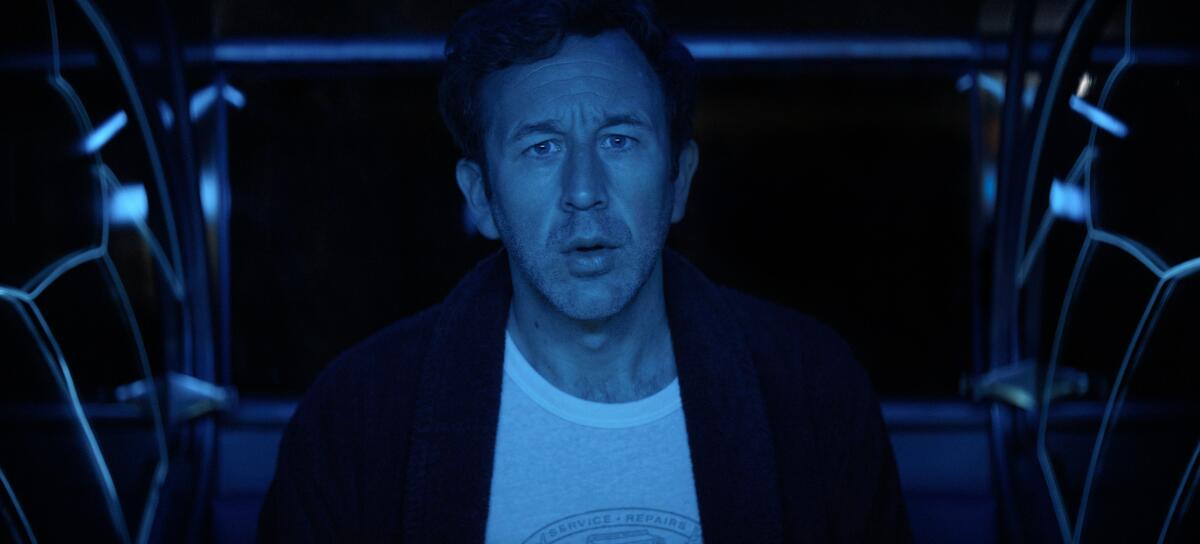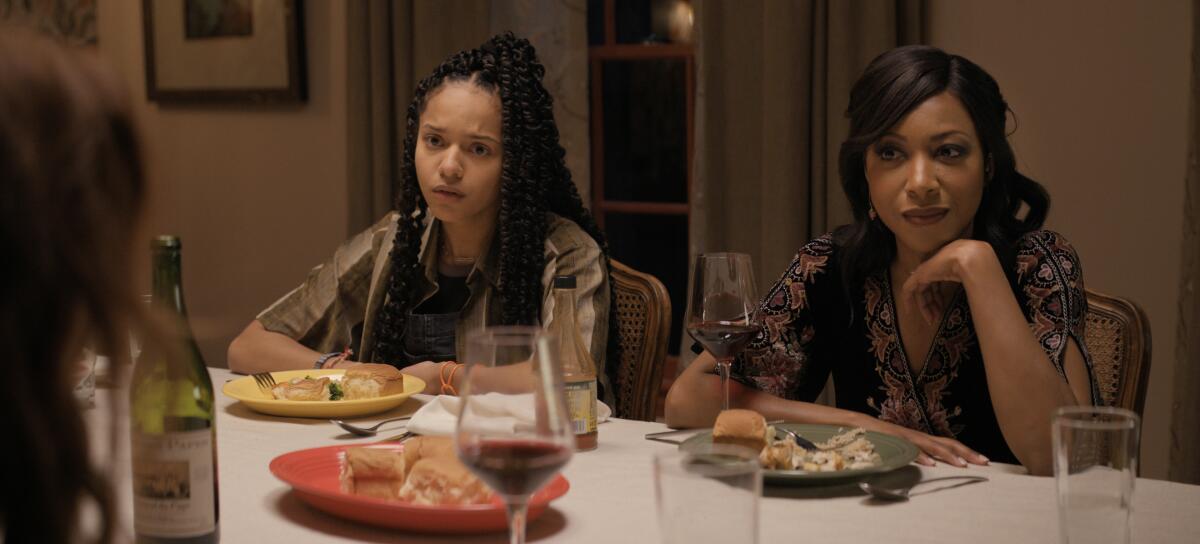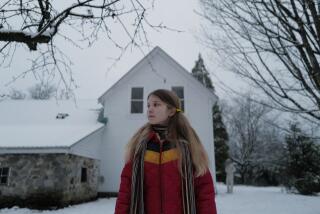‘The Big Door Prize’ review: Chris O’Dowd contemplates life in this pleasing series

- Share via
Premiering Wednesday on Apple TV+, “The Big Door Prize” is “based on the book created by M.O. Walsh,” as it is unusually credited here, and developed by David West Read, a writer and producer on “Schitt’s Creek.” Once again, we are in a whimsical small town, called Deerfield, full of characters that are full of character — your typical television hamlet, at once multicultural and culturally generic. An Anytown, with its grocery, bar, restaurant and high school. Most everyone knows most everyone.
One day, a machine appears in the grocery store. It looks something like an ’80s arcade game, glows blue and bears the image of a butterfly and the words “Morpho. Discover Your Life Potential.” No one knows how it got there — or if anyone does, they aren’t saying — or what makes it go. But its purpose is to dispense a card that, in a word, maybe two, reveals something essential about the user. The townspeople line up to pay the $2 — and, adding the incredible to the fantastic — no one balks when it asks them to enter a Social Security number. (In Walsh’s book, the gizmo reads a person’s DNA, which roots it in real-world questions of predictability; here, it’s just a matter of magic.)
Ordinarily, one would expect such a premise to lead to mayhem and tragedy as secrets are revealed, desires unsuppressed, rash decisions taken — a horror story, founded on the theory that it is only convention and lies and illusion that hold us together, individually and collectively. Lies and conventions and illusions do play a part in “The Big Door Prize”; rash decisions will be taken. But this is a comedy — and not a dark one — that subscribes rather to the notion that change can be good, that the truth sets you free.
Chris O’Dowd plays Dusty, a history teacher who is turning 40, that dangerous age; we get signals that his marriage, to Cass (Gabrielle Dennis), the only relationship he’s ever had, might need a jump-start. His less than adventurous — or perhaps simply satisfied — spirit has come to dominate his family, which also includes daughter Trina (Djouliet Amara), who is dealing with the death of a boyfriend and is turning inward and acting out.
Dusty’s need for spiritual renovation is manifest in his barely concealed displeasure in receiving a birthday gift he didn’t ask for. (That it is a theremin makes this displeasure inexplicable.) That he doesn’t like spicy food feels metaphorically significant.
Concerningly, small blue dots have appeared on his backside. To look at them, one would call them more cosmic than cosmetic.
Cass, for her part, once spent a semester in Florence, a memory she preserves with an interest in wine. She has problems with her diffident mother (Crystal R. Fox), the mayor.
The Morpho cards resonate with many Deerfield residents — and nearly everyone receives one — and they begin to measure who they are against who they might have been. Not every card is flattering; some (like “Gum”) are confusing, which isn’t to say that sense won’t be made of them eventually.
Only sardonic bartender Hana (Ally Maki) opts out, as any sensible person would. The cards lead the school principal to buy a motorcycle, the grocer to become a magician, Dusty’s parents to divorce — his mother to travel in Europe, his father to pursue a late-life career as a male model. (There’s more call for one in Deerfield than you might imagine.)
“It could be argued that it’s just as admirable to do something regardless of what it says on a card,” says Dusty, whose own card suggests that he’s already all the person he’ll ever be.
“You could stay exactly where you are or you could throw yourself into the deep unknown,” Father Reuben (Damon Gupton) suggests to him. He’s a public-school chaplain, a job I am pretty sure does not exist in this country, and something of a barfly.

Dusty and his peers are in some respects still the people they were in high school, with 20 years more baggage. (The current generation of teenagers, less discombobulated by their Morpho readings, seems relatively more mature than their parents.) Egotistical in inverse proportion to his insecurities, Giorgio (Josh Segarra), who runs the restaurant, had a brief career in professional hockey, feasts on past glories and carries a torch for Cass, which he waves incessantly in Dusty’s face. Beau (Aaron Roman Weiner), a Zamboni driver and social nonentity, is sunk in misery, having lost a wife and a son, whose surviving twin is Jacob (Sammy Fourlas). He is a troubled wise child in a complicated relationship with Trina, his late brother’s girlfriend. Beau’s card reads “Sheriff,” which he’ll take to heart.
The tone ranges a bit, from domestic comedy, to farce, to teen drama, to rueful reflection, to wide-eyed wonder, to Wes Anderson exaggeration: Giorgo’s restaurant is topped with a giant spaghetti sculpture, with a canal and a gondola inside. An inn (“the number one nautical-based hotel in Deerfield”) is made to replicate the experience of being on a cruise.
At times, “The Big Door Prize” feels like something the TV writer and producer Bryan Fuller might have cooked up, in a happier mood, more “Pushing Daisies” than “Hannibal.” And there is something in its mystical obfuscations and character alterations that brings “Lost” to mind — a small town is a sort of island, dramatically speaking, that some regard as a paradise and others a prison.
The first eight of the 10 episodes are each named for a different character, presenting more sympathetic portraits of people who might at first seem merely difficult, annoying or awful. It’s a familiar way to develop a story, though the result is a narrative more ambling than compelling, compounded by the fact that the season, though it will settle some characters’ business and make various philosophical points, ends at a kind of dramatic midpoint. (One might argue, as the series does, that life while you live it is always an unfinished story, but in any case, a second season is reportedly in production.)
Nevertheless, “The Big Door Prize” is easy to like and even embrace. O’Dowd’s hangdog comic amiability — I will take any opportunity to recommend his semi-autobiographical “Moone Boy,” whose three seasons you can still find streaming on Hulu, in which he plays the imaginary friend of his younger self — makes him an appealing protagonist. But the whole show is well cast and performed, and even when the action feels overly constructed or declamatory — and there is a rash of declamation toward the season’s end — there is something or someone pleasing to latch onto.
‘The Big Door Prize’
Where: Apple TV+
When: Any time, starting Wednesday
Rating: TV-MA (may be unsuitable for children under age 17)
More to Read
The complete guide to home viewing
Get Screen Gab for everything about the TV shows and streaming movies everyone’s talking about.
You may occasionally receive promotional content from the Los Angeles Times.







